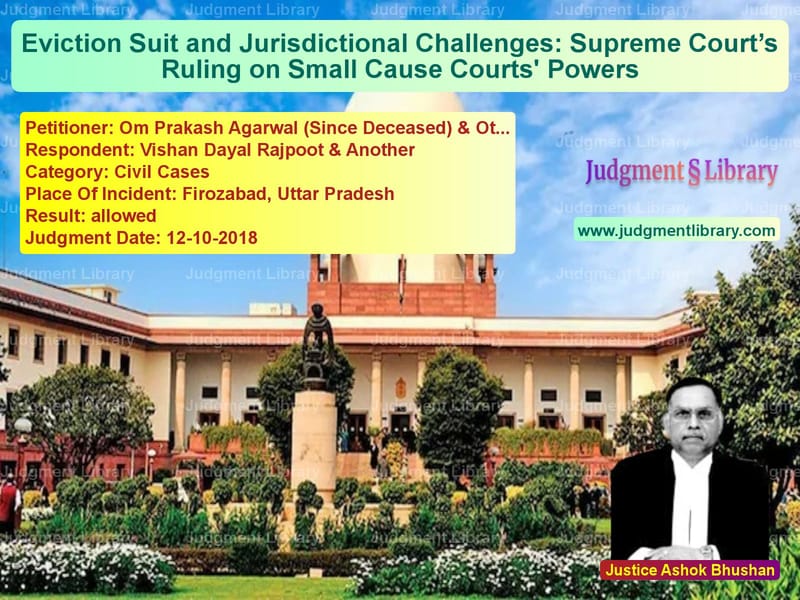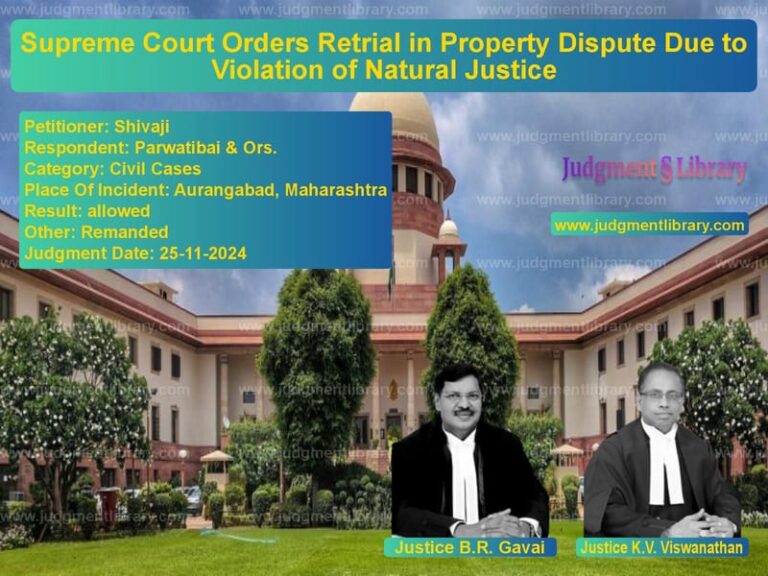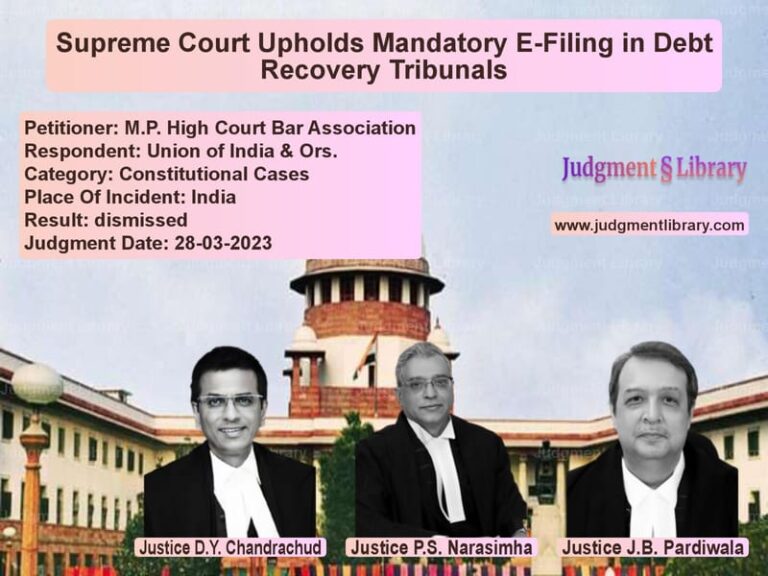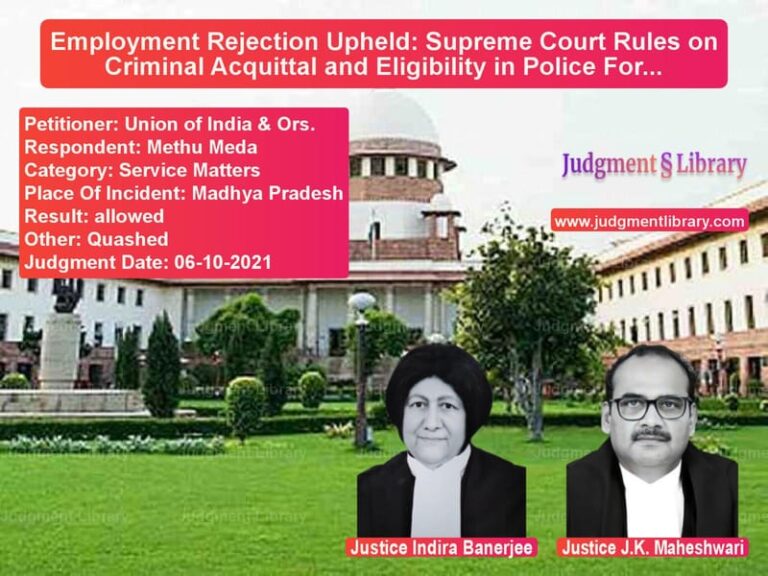Eviction Suit and Jurisdictional Challenges: Supreme Court’s Ruling on Small Cause Courts’ Powers
The Supreme Court of India, in its landmark judgment in Om Prakash Agarwal (Since Deceased) & Others vs. Vishan Dayal Rajpoot & Another, delivered on October 12, 2018, clarified crucial aspects of jurisdictional powers in eviction suits. The judgment examined the impact of the Uttar Pradesh Civil Laws (Amendment) Act, 2015 on the pecuniary jurisdiction of Small Cause Courts and whether ongoing cases should be affected by the new jurisdictional limits.
Background of the Case
The case involved a landlord-tenant dispute over the eviction of the tenant from the rented premises. The suit was initially filed in the Civil Judge (Senior Division) Small Causes Court, Firozabad, seeking eviction, rent recovery, and damages. However, the valuation of the suit was above Rs. 25,000, which was the pecuniary jurisdiction limit of Small Cause Courts at the time.
Due to this valuation, the case was transferred to the Additional District Judge (ADJ). However, with the enactment of the Uttar Pradesh Civil Laws (Amendment) Act, 2015, the pecuniary limit of Small Cause Courts was raised from Rs. 25,000 to Rs. 1,00,000. The key issue in the case was whether the ADJ still had the jurisdiction to hear the case after the amendment or if it should have been reverted to the Civil Judge (Senior Division) Small Causes Court.
Arguments by the Petitioner (Om Prakash Agarwal & Others)
The petitioner (landlord) argued that:
- The amendment applied only to new cases and did not affect pending suits.
- The case was properly transferred to the ADJ before the amendment, and there was no requirement to transfer it back.
- The respondent (tenant) had not objected to the jurisdiction earlier and had fully participated in the proceedings before the ADJ.
- As per Section 21 of the Civil Procedure Code (CPC), objections to jurisdiction must be raised at the earliest opportunity. Since the tenant had not done so, they were barred from challenging jurisdiction at a later stage.
Arguments by the Respondent (Vishan Dayal Rajpoot & Another)
The respondent (tenant) countered with the following arguments:
- The amendment was intended to apply to all pending cases as well, and therefore, the ADJ lost jurisdiction after the pecuniary limit was increased.
- The phrase “cognizance” in the amendment meant that ongoing suits should also be transferred back to the appropriate court.
- Since the valuation of the suit was below Rs. 1 lakh after the amendment, it should have been reverted to the Small Causes Court.
High Court’s Ruling
The High Court accepted the tenant’s argument and ruled that the case should have been transferred back to the Small Causes Court. The High Court directed that the judgment of the ADJ be set aside and that the case be reheard by the appropriate forum.
Supreme Court’s Analysis and Judgment
The Supreme Court analyzed whether the amendment should be applied retrospectively to pending cases and whether the ADJ had the jurisdiction to decide the matter after the amendment.
Key Observations of the Court
- The Court noted that the amendment aimed to improve judicial efficiency by redistributing cases based on their valuation.
- The term “cognizance” used in the amendment suggested that the legislature intended for the new jurisdictional limits to apply to both new and pending cases.
- However, the Court also emphasized the importance of procedural fairness, stating that jurisdictional challenges should be raised at the earliest opportunity.
- The Court observed that the tenant had participated in the proceedings before the ADJ without raising any objection, and as per Section 21 CPC, such objections cannot be entertained at a later stage.
Final Ruling
- The Supreme Court ruled that while the ADJ lacked jurisdiction under the new law, the tenant was barred from challenging jurisdiction at a later stage due to procedural rules.
- The High Court’s order setting aside the ADJ’s judgment was overturned.
- The Supreme Court upheld the ADJ’s judgment in favor of the landlord.
Impact of the Judgment
The ruling has significant implications for civil litigation, particularly in landlord-tenant disputes:
- It clarifies that amendments affecting court jurisdiction may apply to pending cases, but procedural fairness must be maintained.
- It reinforces that objections to jurisdiction must be raised at the earliest possible opportunity.
- It sets a precedent for how courts should handle jurisdictional changes due to legislative amendments.
Conclusion
The Supreme Court’s decision in Om Prakash Agarwal vs. Vishan Dayal Rajpoot ensures a balanced approach to jurisdictional changes in civil law. It upholds legislative intent while also safeguarding procedural fairness, preventing parties from raising jurisdictional challenges opportunistically at later stages.
Petitioner Name: Om Prakash Agarwal (Since Deceased) & Others.Respondent Name: Vishan Dayal Rajpoot & Another.Judgment By: Justice Ashok Bhushan.Place Of Incident: Firozabad, Uttar Pradesh.Judgment Date: 12-10-2018.
Don’t miss out on the full details! Download the complete judgment in PDF format below and gain valuable insights instantly!
Download Judgment: Om Prakash Agarwal ( vs Vishan Dayal Rajpoot Supreme Court of India Judgment Dated 12-10-2018.pdf
Direct Downlaod Judgment: Direct downlaod this Judgment
See all petitions in Landlord-Tenant Disputes
See all petitions in Specific Performance
See all petitions in Damages and Compensation
See all petitions in Judgment by Ashok Bhushan
See all petitions in allowed
See all petitions in supreme court of India judgments October 2018
See all petitions in 2018 judgments
See all posts in Civil Cases Category
See all allowed petitions in Civil Cases Category
See all Dismissed petitions in Civil Cases Category
See all partially allowed petitions in Civil Cases Category






